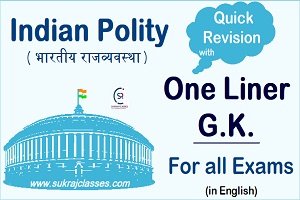
INDIAN POLITICAL SCIENCE- ONE LINER G.K. & QUESTIONS
![]() Council of Ministers is collectively responsible to- Lok Sabha.
Council of Ministers is collectively responsible to- Lok Sabha.
![]() The most important feature of the Cabinet system of government is – Collective Responsibility.
The most important feature of the Cabinet system of government is – Collective Responsibility.
![]() Parliament consists of – President, Lok Sabha & Rajya Sabha.
Parliament consists of – President, Lok Sabha & Rajya Sabha.
![]() What is the main duty of the Legislature – Enacting rules.
What is the main duty of the Legislature – Enacting rules.
![]() Who issues notification of postponement of legislative session – President.
Who issues notification of postponement of legislative session – President.
![]() Who decides whether a bill to be laid in Parliament is a special money bill or not – Speaker of Lok-Sabha.
Who decides whether a bill to be laid in Parliament is a special money bill or not – Speaker of Lok-Sabha.
![]() Who was the first Indian to become the President of the Central Legislature – Vitthal bhai Patel.
Who was the first Indian to become the President of the Central Legislature – Vitthal bhai Patel.
![]() In which type of government does the legislature get more priority than the executive – Parliamentary Government.
In which type of government does the legislature get more priority than the executive – Parliamentary Government.
![]() When government is divided between different organs, what is it called- Distribution of rights.
When government is divided between different organs, what is it called- Distribution of rights.
![]() Who was the first Speaker of the Lok-Sabha of Independent India – G.V. Mavalankar.
Who was the first Speaker of the Lok-Sabha of Independent India – G.V. Mavalankar.
![]() The interval between two sessions of a House of Parliament should not be more than – Six months.
The interval between two sessions of a House of Parliament should not be more than – Six months.
![]() Where can a motion of no confidence be presented against the Union Council of Ministers – only in the Lok Sabha.
Where can a motion of no confidence be presented against the Union Council of Ministers – only in the Lok Sabha.
![]() The Parliament of India is competent to legislate on any subject of the state, if – the emergency situation applies under Article 352 and the Legislative Assemblies of two or more states of the country request it.
The Parliament of India is competent to legislate on any subject of the state, if – the emergency situation applies under Article 352 and the Legislative Assemblies of two or more states of the country request it.
![]() The most important feature of the Indian Parliament is that – it also includes the President.
The most important feature of the Indian Parliament is that – it also includes the President.
![]() The tenure of the Rajya Sabha, which was five years under the original constitution, was increased by the 42nd amendment to how much – Six years.
The tenure of the Rajya Sabha, which was five years under the original constitution, was increased by the 42nd amendment to how much – Six years.
![]() Most of the provisions in the Constitution of India can be amended by – The only Parliament.
Most of the provisions in the Constitution of India can be amended by – The only Parliament.
![]() If the Central Parliament is to take over the legislative powers and subjects included in the State List, then a resolution to this effect will be passed by – Rajya Sabha.
If the Central Parliament is to take over the legislative powers and subjects included in the State List, then a resolution to this effect will be passed by – Rajya Sabha.
![]() How many parliamentary seats are there in Uttarakhand – 5.
How many parliamentary seats are there in Uttarakhand – 5.
![]() How many readings of the Non-Money Bill in each House of Parliament – Three.
How many readings of the Non-Money Bill in each House of Parliament – Three.
![]() ‘Zero Hour’ in the working of the Indian Parliament means – the time between the Question Hour and the next agenda.
‘Zero Hour’ in the working of the Indian Parliament means – the time between the Question Hour and the next agenda.
INDIAN POLITICAL SCIENCE- ONE LINER G.K. & QUESTIONS

